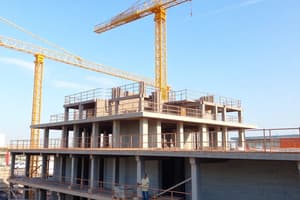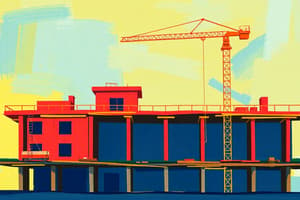Podcast
Questions and Answers
What is the primary goal of the design stage in project management?
What is the primary goal of the design stage in project management?
- To select contractors for the project
- To ensure timely project completion
- To finalize project cost estimates
- To translate the project concept into a physical design (correct)
What is the purpose of submitting design drawings to local authorities?
What is the purpose of submitting design drawings to local authorities?
- To finalize the project budget
- To initiate contractor tenders
- To receive approvals for development and building permits (correct)
- To seek funding for the project
What should the contingency managed during the cost budget phase be used for?
What should the contingency managed during the cost budget phase be used for?
- To fund contractor payments
- To enhance project design quality
- To accommodate unanticipated costs (correct)
- To cover design mistakes
What does the Design Management Plan primarily identify?
What does the Design Management Plan primarily identify?
What is the focus of design evaluation in project management?
What is the focus of design evaluation in project management?
What is the main focus during the Concept Stage of a project?
What is the main focus during the Concept Stage of a project?
Which of the following actions is important to avoid costly rework in the Concept Stage?
Which of the following actions is important to avoid costly rework in the Concept Stage?
What is a key component of the Project Brief during the Concept Stage?
What is a key component of the Project Brief during the Concept Stage?
In which stage do contractors submit cost estimates for review?
In which stage do contractors submit cost estimates for review?
What must be established to ensure quality in a project during the Concept Stage?
What must be established to ensure quality in a project during the Concept Stage?
Which of the following aspects is NOT typically considered in the Concept Stage?
Which of the following aspects is NOT typically considered in the Concept Stage?
What type of decisions are made in the Concept Stage to maximize efficiency?
What type of decisions are made in the Concept Stage to maximize efficiency?
Which stage involves site preparation and arranging materials and equipment?
Which stage involves site preparation and arranging materials and equipment?
What does the Statement of Principal's Needs define?
What does the Statement of Principal's Needs define?
What is the primary purpose of a Scope Statement?
What is the primary purpose of a Scope Statement?
What does a Feasibility Study evaluate?
What does a Feasibility Study evaluate?
Which key component sets the long-term goals and approach for a project?
Which key component sets the long-term goals and approach for a project?
What does a Project Brief summarize?
What does a Project Brief summarize?
What is the role of Consultant Agreements during the initial phase of a project?
What is the role of Consultant Agreements during the initial phase of a project?
Which option best describes the Project Organization stage?
Which option best describes the Project Organization stage?
What does the Strategic Plan NOT typically include?
What does the Strategic Plan NOT typically include?
Flashcards
Conceptual Stage
Conceptual Stage
The initial stage of a project where stakeholders collaborate to define project goals, assess feasibility, and establish a clear project vision.
Project Brief
Project Brief
A document that outlines the client's needs, project objectives, and desired outcomes. It acts as a guide for the entire project.
Early Decisions
Early Decisions
Decisions made during the conceptual stage that impact the project's design, resource allocation, and overall efficiency.
Avoiding Misinterpretation
Avoiding Misinterpretation
Signup and view all the flashcards
Project Goals
Project Goals
Signup and view all the flashcards
Project Resources
Project Resources
Signup and view all the flashcards
Performance Standards
Performance Standards
Signup and view all the flashcards
External Factors
External Factors
Signup and view all the flashcards
Statement of Principal's Needs
Statement of Principal's Needs
Signup and view all the flashcards
Scope Statement
Scope Statement
Signup and view all the flashcards
Feasibility Study
Feasibility Study
Signup and view all the flashcards
Strategic Plan
Strategic Plan
Signup and view all the flashcards
Consultant Agreements
Consultant Agreements
Signup and view all the flashcards
Design Stage
Design Stage
Signup and view all the flashcards
Suitability of Design
Suitability of Design
Signup and view all the flashcards
Contingency Management
Contingency Management
Signup and view all the flashcards
Design Evaluation
Design Evaluation
Signup and view all the flashcards
Buildability
Buildability
Signup and view all the flashcards
Study Notes
Project Stages
- Concept Stage: Initial project idea development, involving stakeholder discussions on goals and feasibility
- Design Stage: Detailed plans, blueprints, and models are created by architects and engineers
- Tendering Stage: Contractors submit cost estimates, and project managers review options
- Preconstruction Stage: Site preparation, material and equipment arrangement
- Construction Stage: Actual building work, with workers and machinery on-site
- Commissioning Stage: Final inspections ensure project meets requirements and is ready for handover
Conceptual Stage Overview
- Project Brief: Defines client needs and project goals (e.g., office project brief outlining size, style, budget)
- Early Decisions: Choices about design and resources to maximize efficiency and minimize later changes (e.g., choosing sustainable materials)
- Avoiding Misinterpretation: Clear understanding of client needs to prevent costly rework (e.g., accounting for classroom space in a school design)
Key Questions in the Conceptual Stage
- What does the principal need and want? Defining primary goals and objectives (e.g., patient capacity and healthcare services for a hospital)
- What resources are required? Identifying necessary materials, labor, and funding (e.g., specific materials like steel and concrete, skilled engineers for a bridge project)
- What resources are available? Assessing existing resources versus what needs to be acquired (e.g., using existing equipment to reduce costs)
Key Issues in the Conceptual Stage
- Statement of Principles Needs: Defines what the client wants to achieve (e.g., a new sports complex)
- Scope Statement: Outlines the project's boundaries and key deliverables
- Feasibility Study: Assessing project achievability within constraints
- Strategic Plan: Setting long-term goals and approach
- Project Organization: Establishing roles and responsibilities
- Project Brief: Summarizing key details and requirements for designers
Feasibility Study
- Assesses project possibility, considering technical, financial, and environmental aspects
- (e.g., soil stability and financial return for a high-rise)
Strategic Plan
- Details project purpose, personnel, timeline, budget, and execution approach
- (e.g., phased approach, project roles, total cost, and environmental considerations for a bridge)
Project Brief
- Summarizes client goals, project scope, budget, and schedule to guide the design process
- (e.g., specifying number of classrooms, budget limits, and completion date for a school)
Consultant Agreements
- Contracts for specialists (architects, environmental consultants) to develop the project concept
- (e.g., hiring specialists to create preliminary designs for a new office building)
Design Stage
- Managing the Design Stage: Translating project concept into physical designs (drawings, specifications)
- Documentation: Drawings submitted to local authorities for approvals (development/building permits).
- Purpose: Forming the basis for tender documents (used to seek contractors).
- Importance: Design documentation quality impacts overall project time, cost, and quality. Poor design management leads to delays and higher costs.
Suitability of Design
- Goal: Ensures overall design and aspects meet the principal's intended purpose
- Design Management Plan: Identifies who's responsible for confirming design suitability and compliance with requirements
Cost Budget
- Formulation: Total project cost set during pre-design phase with initial contingency for unknown costs
- Contingency Management: Reserve for unexpected costs, not mistakes in the design. Proper management is crucial to avoid misusing funds
Design Evaluation
- Purpose: Value management systematically evaluates the project's design
- Focus: Ensures functionality, economy, and meeting objectives
- Buildability: Improves design's ease of construction, ensuring efficient build
Studying That Suits You
Use AI to generate personalized quizzes and flashcards to suit your learning preferences.




